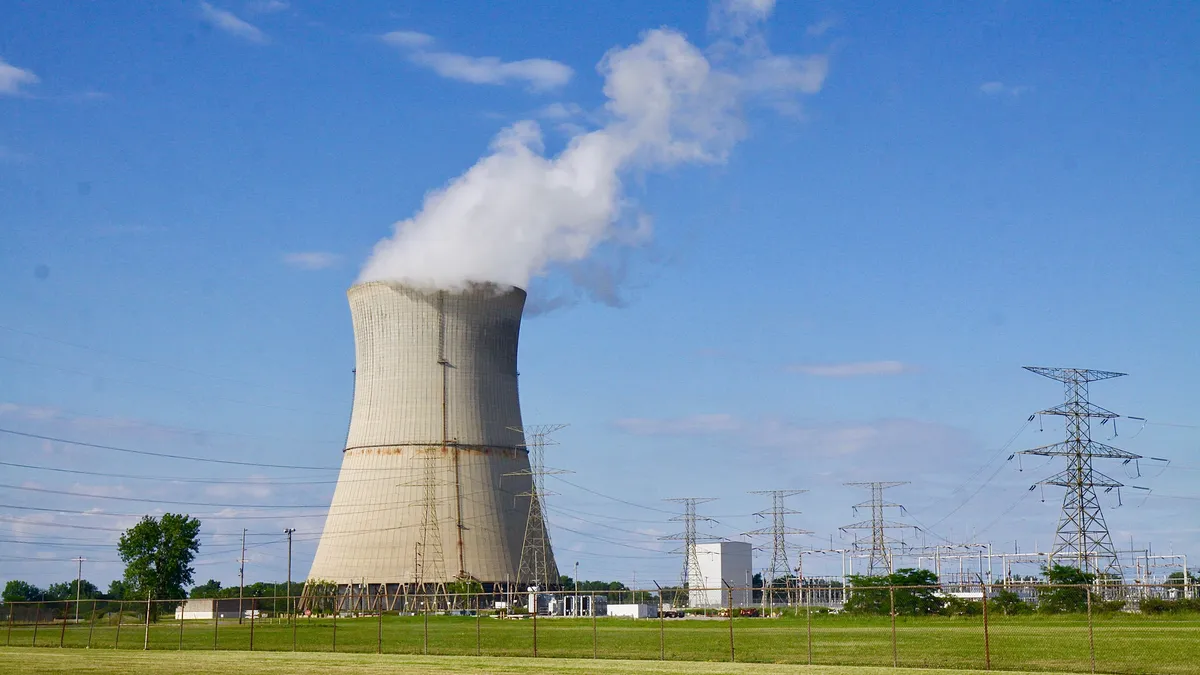Dive Brief:
- A bipartisan group of U.S. senators on Monday introduced legislation intended to reduce regulatory costs for licensing advanced nuclear reactor technologies, require the Nuclear Regulatory Commission to encourage licensing of nuclear facilities at brownfields and establish other routes to more quickly expand nuclear power.
- The push comes as the industry and policymakers work on several fronts to build out nuclear energy — particularly advanced reactors and small modular reactors, or SMRs — to decarbonize energy.
- Edwin Lyman, director of nuclear power safety at the Union of Concerned Scientists, a nuclear watchdog group, dismissed the legislation as a “grab bag of special interest provisions.”
Dive Insight:
The legislation was introduced by Democratic Sens. Cory Booker of New Jersey, Tom Carper of Delaware, Martin Heinrich of New Mexico, Mark Kelly of Arizona and Sheldon Whitehouse of Rhode Island. Republican backers are John Barrasso of Wyoming, Shelley Moore Capito of West Virginia, Mike Crapo of Idaho, Lindsay Graham of South Carolina and Jim Risch of Idaho.
“Preserving and expanding our nation’s use of clean and reliable nuclear energy is essential to advancing America’s energy and national security interests and achieving our environmental goals,” the lawmakers said.
The senators also cited energy security as a foreign policy objective.
“Russia’s ongoing war in Ukraine and China’s aggressive nuclear buildout highlight the importance of American leadership in providing energy security — at home and abroad,” they said.
The ADVANCE Act, Accelerating Deployment of Versatile, Advanced Nuclear for Clean Energy, would modernize what the lawmakers say are outdated rules restricting international investment, reduce regulatory costs for companies seeking to license advanced reactor technologies, extend an established indemnification policy for continued operation of reactors and “give certainty” for capital investment in building reactors and establish other provisions.
The legislation also would establish a joint initiative between the departments of Commerce and Energy for outreach to nations seeking to develop advanced nuclear energy programs, identify manufacturing techniques to improve construction of nuclear reactors and authorizes funding to help clean up legacy abandoned mining sites on Tribal lands.
The legislation is supported by the Nature Conservancy, United Association of Journeymen and Apprentices of the Plumbing and Pipefitting Industry and other industry players such as Xcel Energy, TerraPower and X-Energy.
It’s at least the second Senate measure introduced recently to strengthen the nuclear industry. Barrasso and Sen. Joe Manchin, D-W.Va., backed legislation in February to strengthen domestic production of nuclear fuel.
Judi Greenwald, executive director of the Nuclear Innovation Alliance, said in a statement the most recent legislation is “further evidence of the growing interest in advanced nuclear energy technologies.” If enacted, it will help re-establish U.S. international competitiveness and global leadership in nuclear energy, she said.
Lyman said the legislation is weakened by an absence of spending provisions, though it authorizes superfunds at abandoned mining sites on tribal lands. In addition, he said studies called for in the bill are “busy work” and provisions to cut regulatory costs for licensing reactor technologies “sounds like things applicants are lobbying for.”
The legislation authorizes the NRC to establish an International Nuclear Reactor Export and Innovation Branch to carry out international nuclear reactor “export and innovation activities.”
Columbia University’s Center on Global Energy Policy said in an August 2022 report that the federal government has not financed a new U.S. reactor export in decades.although the US government has been actively developing advanced reactor technologies though the Export-Import Bank and International Development Financing Corporation are capable of supporting such exports.















